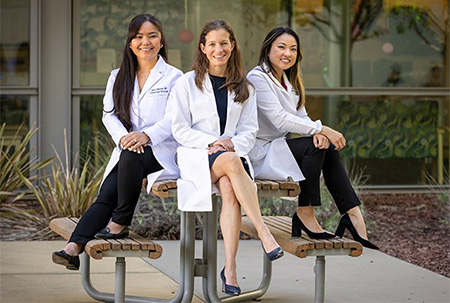September is Ovarian Cancer Awareness Month. UC Davis Comprehensive Cancer Center wants women to be equipped with the latest information about the devastating disease that is estimated to take the lives of more than 13,000 women in the U.S. this year.
There is hope. Ovarian cancer patients are living longer because they have more treatment options, but the cancer still frustrates doctors and their patients because it often is undetected until it has spread. The problem is that the symptoms are nonspecific and can often be discounted as gas, bloating or attributed to other causes.
Listen to your body
UC Davis gynecologic oncologist Rebecca Brooks said, "Women need to know what to watch for, trust their instincts, and see a doctor in order to give themselves the best chance of identifying and beating this tough cancer."

Brooks and colleague Nancy Nguyen specialize in cancers of the female reproductive system.
"Treatment advancements are helping save lives, but we still need to improve the odds of finding the cancer earlier when treatment has the best chance of being successful," Nguyen said.
Nguyen and Brooks are teaming up to help women advocate for themselves.
"Ovarian cancer awareness is gaining momentum but has been slower to gain attention because it is less common and also less publicized than the breast cancer movement," Brooks said. "We want to make sure that cancers of the reproductive organs, such as ovarian cancer, are getting the attention they deserve."
Few warning signs
Unlike mammograms that spot most breast cancer, no uniformly effective screening is available for ovarian cancer, and the symptoms are often silent in the early stages. As the cancer progresses, the following symptoms may emerge:
- Bloating or abdominal swelling
- Decreased appetite, getting full quickly, weight loss
- Pelvic pain
- Changes to bowel or bladder habits
"Women need to push for evaluation if they have symptoms that are suspicious," Brooks said. "Ovarian cancer often lingers for months before diagnosis, if not years, which can be a big disadvantage for our patients."
Risks of getting ovarian cancer include:
- Having children later in life or never having a full-term pregnancy
- Older age
- Family history of breast or ovarian cancer
Genetic Factors

Read one woman's story
Ovarian cancer survivor Marie Kennedy wasn't diagnosed until she was stage IV.
The American Cancer Society reports that up to 25% of ovarian cancers are part of what are called family cancer syndromes resulting from inherited changes in certain genes.
Mutations in the BRCA1 or BRCA2 genes are responsible for most inherited ovarian cancers and are about 10 times more common in Ashkenazi Jewish people. A number of other genes may increase risk as well.
"If you do have a genetic mutation such as BRCA1 and BRCA2, you will be at higher risk and could get ovarian cancer at a much younger age," Brooks said. "That's why obtaining an accurate family history and screening appropriate candidates are crucial for identifying patients who can be saved from this disease."
Clinical trial is enrolling ovarian cancer patients
Ovarian cancer occurs in the layer of cells covering the ovary and many are thought to begin in a projection at the far end of the fallopian tubes called the fimbria, which sits adjacent to ovaries.
"We now know that the most common type of ovarian cancers likely develop from the ends of the fallopian tubes," Nguyen said.
UC Davis Comprehensive Cancer Center has opened a clinical trial for women who have a BRCA1 mutation and want to reduce their chances of getting ovarian cancer later in life. It is called the SOROCk clinical trial and it is being led by UC Davis clinical scientist Hui Amy Chen.
"We want to see if removing the fallopian tubes and waiting to remove ovaries until a later time is effective at reducing the risk of younger women getting ovarian cancer later in life," Chen said.
The standard approach of removing the ovaries first sends women into a surgically induced menopause, which is difficult for a lot of women.
The clinical trial is open to women with the BRCA1 mutation between the ages of 35 and 50. The study also surveys women before, during, and after their treatment to gauge their overall quality of life.






